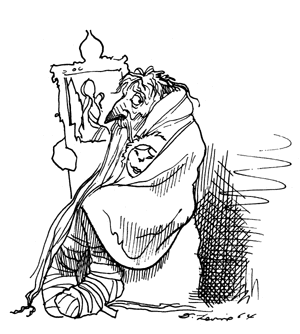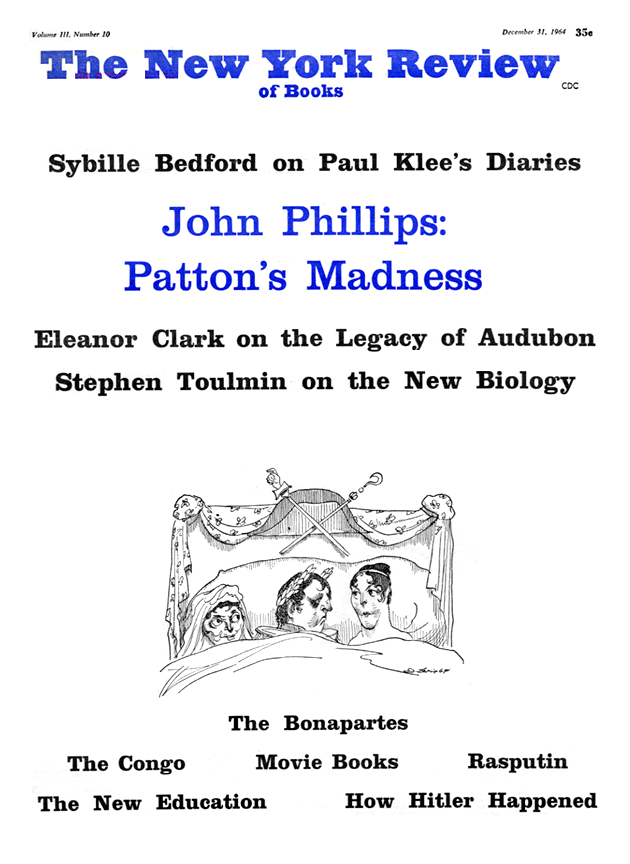To the average, semi-informed citizen of the Western world the “holy devil,” Grigory Rasputin, is certainly one of the most familiar figures in Russian history, ranking perhaps behind only Peter the Great, Lenin, and Stalin in general notoriety, and behind only Ivan the Terrible in the morbid fascination his memory evokes. Virtually everyone old enough to read—or simply to go to the movies—has some notion of the melodrama of his destiny; his beginnings as a wandering peasant holy man from Siberia; his almost superhuman sexual prowess and capacity for alcohol; his rise to favor at the court of the last Tsar because of his (apparent) ability to cure the heir to the throne of attacks of hemophilia; his exploitation of the influence he thus enjoyed with the Tsarina to interfere in affairs of state during the First World War; his murder on the eve of the Revolution by conservatives, fearful that his power would bring the monarchy to ruin; his uncanny vitality to the last, enabling him to survive his assassins’ poisoned cakes and wines, and even their pistol shots, thereby obliging them to finish the job by shoving their still-living victim beneath the ice of the Neva. To the Western imagination Rasputin almost inevitably appears as an illustration à rebours of the themes of Dostoevsky or Berdiaev, or as some north-woods Priapus crossed with a Father Zossima; he is a type, clearly, that could have been spawned only by the wild conditions of Russian life and the bizarre historical processes of the empire of the tsars. Like the average, semi-informed citizen, Mr. Colin Wilson, too, has been struck by the melodrama of Rasputin, as well as intrigued by the vagaries of the “Russian soul” unlike other averagely informed persons, however, he has chosen to rehearse his random readings on these two subjects for the length of an entire volume.
It is difficult to know how to approach the resulting book. If one takes it as a serious historical study—as one seems invited to do by the title’s reference to “the fall of the Romanovs,” presumably to be explained in the body of the work, as well as by the author’s numerous footnotes and his solemn efforts to ferret out contradictions between various memoirists so as to establish in scholarly fashion the record of Rasputin’s career—the result must be written off as a total disaster. Mr. Wilson’s foray into history suffers from all the failings which beset the autodidact (as has been frequently pointed out in reviews of his previous works, beginning with The Outsider), with the notable difference that in the present instance these failings are compounded many times over by his radical lack of familiarity with the subject at hand. It is one thing to “work up” on one’s own a dozen or two classics of literature and philosophy in order to produce such an essay as The Outsider, whose unity derives less from the material employed than from the point of view of the author; it is quite another, and more difficult, matter to become sufficiently acquainted with a whole society and culture, whose language moreover one does not know, so as to comment in more or less plausible fashion on something as complex as “the fall of the Romanovs,” a phenomenon whose structure is given by objective events and not by the author’s cast of mind. The result is, and could only be, an accumulation of elementary errors—such for example, as situating the Balkans between Russia and Austria, a “fact” which in turn is offered as a partial explanation for the origins of the First World War—which it would be indecently easy to catalogue here with the pedantic merriment of the specialized reviewer.
But what is more important than Mr. Wilson’s endless errors of fact is his complete lack of any historical or sociological sense. To cite only one of the more striking examples of this, we may choose the following: after insisting, quite correctly, that Rasputin constantly advised Nicholas II against war, notably in the Balkan crises of 1909 and 1912, the author proceeds to speculate on the consequences of the monk’s absence from St. Peterburg in the summer of 1914. At that time Rasputin was visiting his native village of Pokrovskoe in Siberia, where, Mr. Wilson goes on to explain, he was stabbed and almost killed by a disillusioned (female) penitent—as it happened, on the very day that Archduke Franz Ferdinand was assassinated in Sarajevo. Our historian comments:
There are fifty degrees of longitude between Sarajevo and Pokrovskoe, which means that eleven o’clock in Sarajevo is about two-fifteen in Pokrovskoe. It is a strange coincidence that the two assassins struck at almost exactly the same moment—a coincidence that makes one inclined to doubt the “blindness of history.” Ferdinand’s death made war possible; Rasputin’s injury made it certain, for he was the only man in Russia capable of averting it.
To which the author, apparently fearful lest the reader underestimate the magnitude of this contribution to our understanding of the origins of the First World War, adds in a footnote: “As far as I know, this coincidence has never been pointed out before.” As a serious work on Russian history, or even as a piece of popularization, Mr. Wilson’s Rasputin is not worth five minutes of any reader’s time. The kindest attitude that one can take toward it is to forget that it ever existed; jetons un voile, et passons outre.
Advertisement
This book, however, is meant to be not just a study of history; it is intended also as a “kind of appendix to The Outsider“—a work which, it may or may not be remembered, concluded that modern man, living under the conviction of sin yet unable to accept traditional Christianity, “needs a new religion.” For Mr. Wilson, Rasputin is interesting not primarily as a historical figure, but as a man whose inner, spiritual reality no more than “intersects history.” (By way of clarification, it should be pointed out that in Mr. Wilson’s view “history” is a thoroughly depressing and quite trivial thing, made up of “wars, massacres, murders, revolutions, persecutions.”) “Rasputin’s life, then, is not ‘history’; it is the clash of history with subjectivity”; the hero is, indeed, “a Laocoön being strangled by history.” By this is meant that Rasputin was a man who, despite his undeniable love of power and his addiction to the pleasures of the couch and the bottle, was basically a seeker after an “inner truth” lying in the realm of religion, which “by its nature [is] anti-historic.” Thus Mr. Wilson sees his task as one of rescuing Rasputin from his previous biographers—all of whom have concentrated exclusively on the sensational, the scurrilous, or the “merely” historical in their subject’s career—and of presenting him instead as a saint sui generis, even as a prophet, who could have prevented the First World War and who, having missed that opportunity, might by the memory of his example still “act” in some unspecified way “in the next century.”
The evidence for Rasputin’s peculiar sanctity Mr. Wilson finds in his thaumaturgic and hypnotic powers—real enough in some measure, however one explains their origins, but which Mr. Wilson naively magnifies and idealizes—and in his gifts of “telepathy, secondsight, and pre-vision,” attributes for which there is no convincing evidence whatsoever. It is possession of these qualities—in truth slightly prized by traditional religion—that makes Rasputin the supreme Outsider that mixture of the anguished existentialist hero, the seeker after God in a postreligious culture, and the saint-in-embryo. Indeed, Rasputin is among the greatest of all prophets of the “inner truth” of the “new religion”—greater than the political idealists, such as Garibaldi and Lenin, who are still prisoners of “history”; greater than the pure artists, such as Rilke and Van Gogh, who have completely withdrawn into the world of “subjectivity”; and on a level with such spiritual giants as Nietzsche, Nijinsky, and Gurdjieff (another Russian “mystic” of the day and a hero of Mr. Wilson’s first book), who alone are able to bring their inner vision to bear on the “nightmare of history,” uplifting and purifying it in some nameless manner.
Even if one concedes that there is some merit in Mr. Wilson’s message of the Outsider-as-embryo-saint (a concession that represents a considerable act of charity, for the believer and the unbeliever alike), it is impossible to agree that the carnal, superstitious, and opportunistic muzhik, Grigory, is appropriately cast in such an excessively literary and metaphysical role. Nietzsche, Camus, Lawrence, Cardinal Newman, Kierkegaard, or any of the other authorities of The Outsider, even Nijinksy and Gurdjieff—yes; but the semi-literate Siberian Cagliostro of the Russian Revolution—no! In expounding his philosophy Mr. Wilson would have been better advised to have walked wide of the “nightmare of history” and to have stuck to his original literary and philosophical exemplars, for these at least he does know and, after his own fashion, is at home with. Or perhaps he should have eschewed altogether the tricky paradoxes of post-religious canonization and left them, say, to the more dialectical talents of the author of Saint Genet.
In the event, however, that Mr. Wilson should desire to persist in his explorations of Russian mysticism, he should be apprised of one “fact” which his research thus far has not uncovered. Among his more dubious opinions about Russian history is his acceptance of the legend that Alexander I did not die in 1825 but instead stole off to Siberia to live out his days as the holy hermit, Fedor Kuzmich. In similar fashion, but this time in actual fact, Rasputin was not completely assassinated in 1916; after his would-be murderers departed from the banks of the Neva, he emerged from the ice a little farther downstream and was spirited away to Alaska by powerful friends at court. As late as 1945 when this reviewer met him (see also Newsweek magazine for the spring of that year) he was still guarding the tomb of an Orthodox holy man near Kodiak and debauching the Alyeut women—contrasting occupations that indicate this starets could only have been Rasputin. And he may well be there yet, awaiting the day when the Outsider-saint at last comes into his own, if not in the present century, then certainly in the next.
Advertisement
This Issue
December 31, 1964



